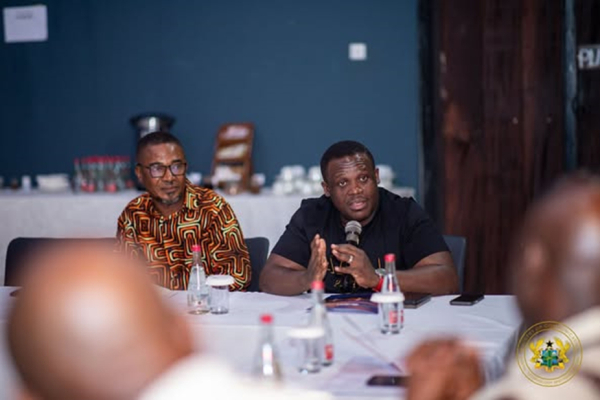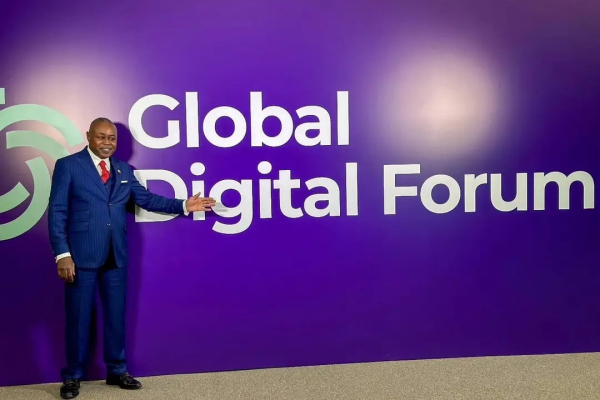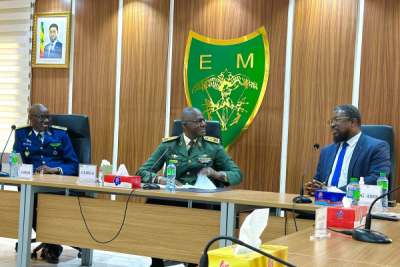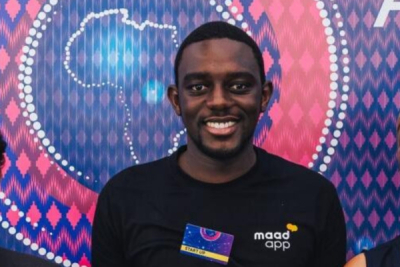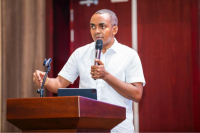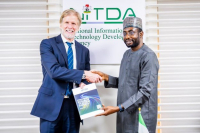Ghana’s digital economy is growing rapidly, with increasing reliance on fintech, e-commerce, and digital transactions. Strong legal frameworks are essential to protect businesses and consumers from cyber threats and ensure compliance with international data protection standards.
Ghana’s Ministry of Communication, Digital Technology and Innovations (MoCDTI) has announced plans to introduce 15 new digital laws aimed at strengthening cybersecurity, data protection, and digital economy regulation. The announcement was made on June 8 during a two-day workshop with Parliament’s Select Committee on Information and Communications, where the Ministry reaffirmed its commitment to transparency and collaboration in shaping the country’s digital future.
The proposed laws will focus on several critical areas, including cybersecurity regulations, data protection, and digital economy governance. As cyber threats continue to evolve, Ghana needs a robust legal framework to safeguard businesses and individuals from digital risks. The cybersecurity laws will enhance protections against cyberattacks, ensuring compliance with global security standards and reinforcing national resilience against digital threats. Additionally, the data protection laws will strengthen privacy rights, regulating how personal and corporate data is collected, stored, and used. With the increasing reliance on digital transactions, these measures will provide citizens with greater control over their information while ensuring businesses adhere to ethical data practices.
Another key aspect of the legislative agenda is the governance of Ghana’s digital economy. As fintech, e-commerce, and digital transactions become more prevalent, clear policies are needed to regulate these sectors effectively. The new laws will establish guidelines for digital financial services, ensuring consumer protection and fostering innovation.
Institutional reforms are also a major focus of the proposed legislation. One of the most significant changes discussed at the workshop is the transformation of the National Information Technology Agency (NITA) into a purely regulatory body. Currently, NITA operates both as a regulator and a service provider, which can create conflicts in governance. Under the new framework, its service-provider functions and government IT assets will be transferred to a separate entity, ensuring a clearer distinction between regulation and service delivery. This transition is expected to improve efficiency, streamline operations, and enhance oversight of Ghana’s digital infrastructure.
With Ghana’s digital economy expanding rapidly, these laws are essential for protecting citizens and businesses from cyber risks, encouraging investment in technology, and ensuring compliance with international data protection standards. The Ministry’s proactive approach signals a strong commitment to fostering innovation while maintaining security and accountability in the digital space.
The proposed laws will be rolled out in phases for parliamentary review, allowing for thorough discussions and stakeholder engagement. As Ghana positions itself as a regional digital leader, these legislative reforms will play a crucial role in shaping the country’s tech-driven future, ensuring that policies and infrastructure developments support sustainable growth and innovation.
Ghana has been actively developing laws to regulate and strengthen its digital economy. These laws aim to enhance consumer protection, regulate digital transactions, and ensure compliance with international standards. The country has existing digital laws such as the Electronic Transactions Act (2008), which grants legal recognition for electronic records, and the Payment Systems and Services Act (2019), which regulates digital financial services. The Cybersecurity Act (2020) established the Cybersecurity Authority, ensuring national security against cyber threats.
Hikmatu Bilali
In the Face of Rising Digital Sovereignty Challenges, Congo Calls for Stronger Africa–Russia Cooperation. Léon Juste Ibombo advocates for a partnership-based approach built on skills exchange, sovereign technologies, and capacity building.
Congo's Minister of Posts, Telecommunications and the Digital Economy, Léon Juste Ibombo (photo), called for pragmatic cooperation between Africa and Russia, emphasizing digital sovereignty as a central challenge. He made these remarks during the "Russia–Africa: Shared and Sustainable Digital Sovereignty" session at the Global Digital Forum 2025, held June 5-6 in Nizhny Novgorod.
In his address, Ibombo outlined six priority areas for collaboration. He advocated for the transfer of skills in artificial intelligence, cybersecurity, and big data. He also proposed the development of shared computing centers for sovereign data governance, and the co-design of open-source solutions tailored to African needs. Other key areas included exchanges on digital taxation and industrial traceability, the organization of joint training programs, and the alignment of African and Russian positions within international digital regulatory bodies.
Congo's appeal comes as several African countries have already begun digital cooperation with Russia. Zimbabwe, for instance, has implemented an e-governance program with Moscow to boost public administration efficiency and combat corruption. Angola has signed a digital agreement with Russia covering fiber-optic networks, telecommunications satellites—including the AngoSat-2 project—and cybersecurity. Furthermore, the expansion of Russia's sovereign software MyOffice in several African nations, such as Cameroon, the Democratic Republic of Congo, and Guinea, signals a clear push for digital independence.
Russia holds a significant technological advantage, with established expertise in cybersecurity, sovereign software development, and sensitive data infrastructure. Through its existing digital partnerships, Russia offers Africa alternative solutions to the model of major Western platforms, while also aiming to train African operators in best practices.
This partnership could move Africa closer to a more autonomous digital model, built on dedicated infrastructure, strengthened local skills, and increased sovereignty in international negotiations. By diversifying its technological partnerships, the continent is positioning itself to build robust, sustainable, and politically independent digital foundations.
By Samira Njoya,
Editing by Sèna D. B. de Sodji
With the launch of its nanosatellite Gaindesat-1A, Senegal has taken a major step forward in its space strategy. The country now aims to position space as a strategic lever for development and sovereignty.
Senegal's General Staff of the Armed Forces (EMGA) and the Senegalese Space Studies Agency (ASES) signed a five-year memorandum of understanding on Thursday, June 5, to develop the country's first national satellite constellation. This strategic initiative aims to enhance technological sovereignty and strengthen national defense capabilities.
"By creating ASES, the Senegalese government has made its ambitions clear: to position the space sector as a cross-cutting lever for impact across all domains—starting with security," said Maram Kaïré, Director General of ASES, praising the government’s forward-thinking approach.
The project involves deploying a constellation of nanosatellites. These small, orbiting satellites will work in coordination to provide continuous and comprehensive coverage of Senegal’s territory. Key applications include Earth observation to support security, environmental monitoring, and natural resource management.
European aerospace company Prométhée Earth Intelligence will provide technical support. Prométhée, which specializes in satellite technology and Earth observation data analytics, will collaborate closely with Senegalese authorities to co-develop a sovereign, sustainable, and inclusive space capability.
Once operational, the satellite constellation will enable real-time surveillance of national territory. This will meet security needs while also supporting biodiversity protection, risk prevention, and economic development. The technology is expected to have applications in areas such as precision agriculture, land use planning, and infrastructure management.
With fewer than 50 African nations possessing national satellites, this agreement represents a major step forward in Senegal’s technological sovereignty. It is part of the broader SenSAT national space program, which seeks to establish autonomous space capabilities for the country.
Beyond security, the project is poised to drive innovation, create high-value jobs, and enhance Senegal’s control over geospatial data, solidifying space as a pillar of long-term strategic independence.
By Samira Njoya,
Editing by Sèna D. B. de Sodji
Determined to modernize agriculture, he is leveraging technology to tackle Africa’s food challenges with practical, scalable solutions.
Baraka Chijenga (photo), a Tanzanian entrepreneur, is the founder and CEO of Kilimo Fresh, a Dar es Salaam-based startup that is using technology and data analytics to transform agricultural supply chains. Since its launch in 2019, the company has been connecting hundreds of smallholder farmers with thousands of retailers, hotels, and restaurants—aiming to streamline distribution and drastically reduce food waste.
At the heart of Kilimo Fresh’s model is an intuitive online platform that allows buyers to order fresh produce and dry goods, which are then delivered directly to their doorstep. The company relies on predictive analytics to anticipate demand, optimize inventory, and minimize losses. It also supports farmers in adopting sustainable practices and integrating modern agricultural technologies.
On Thursday, June 5, Kilimo Fresh was named a finalist in the AYuTe NextGen competition, an initiative led by Heifer International Africa that highlights tech-driven ventures tackling the agricultural sector’s most pressing challenges.
Before launching Kilimo Fresh, Chijenga co-founded Eliminex Tanzania Limited, a company focused on organic fruit and vegetable production, free from synthetic inputs and agrochemicals. Founded in 2014, Eliminex laid the groundwork for his mission to promote sustainable agriculture.
A 2015 graduate of Mzumbe University in Tanzania, where he earned a bachelor’s degree in entrepreneurial development, Chijenga began his career as a finance officer at Pyramid Pharma, a healthcare solutions provider. From 2017 to 2019, he expanded his horizons in West Africa, helping Pacific Diagnostics scale its operations in Nigeria and Ghana.
In 2021, he gained continental recognition as a finalist in the GoGettaz Agripreneur Prize Competition, which spotlights the most promising young agri-entrepreneurs across Africa.
By Melchior Koba,
Editing by Sèna D. B. de Sodji
A serial entrepreneur, he combines technical and financial expertise to modernize local commerce across Africa.
Sidy Niang (photo) is one of the co-founders of Maad, a Senegalese start-up that is modernizing supply chains to serve small retailers. Launched in 2020, Maad leverages technology to tackle a core challenge in African commerce: fragmented and inefficient distribution.
Through its digital platform, Maad connects suppliers directly to retailers. Store owners can order, pay, and arrange delivery with just a few clicks—reducing stockouts and logistics costs. “With our technology and logistics infrastructure, we support the economic development of traditional retail and the food and beverage businesses that are part of the Maad community,” the company says.
For suppliers, Maad offers real-time product performance tracking and benchmarking tools. A mobile app lets them manage sales teams and marketing operations. Their products also gain exposure to a network of 20,000 retailers, boosting sales growth.
A multi-faceted entrepreneur, Sidy Niang is also co-founder and investor in Joloff Food, a virtual corporate canteen based in Dakar. Founded in 2019, the service delivers over 6,000 meals a month.
Niang holds a Master’s in Finance and Strategy from CentraleSupélec in France, earned in 2016. He began his career in 2012 at Louis Vuitton in Paris, working as a consultant optimizing supply chains using emerging technologies.
In 2013, he joined Millicom (Tigo) in Senegal as a technical support engineer, before moving to BNP Paribas in 2014 as an M&A analyst. In 2015, he joined Mediterrania Capital Partners in Morocco as an investment analyst. The following year, he moved to the International Finance Corporation (IFC), where he served successively as an analyst and associate in investment.
By Melchior Koba,
Editing by Sèna D. B. de Sodji
Senegal’s start-up ecosystem is rapidly expanding, driven by both government and private initiatives. Technological innovation is seen as a strategic lever to boost the economy and tackle development challenges.
Senegal's Ministry of Communication, Telecommunications and the Digital Economy (MCTN) and U.S. tech group Meta announced Thursday, June 5, the launch of Llama Impact. This new acceleration program aims to support Senegalese startups leveraging open-source artificial intelligence (AI) in high-impact sectors.
The program targets early-stage ventures, focusing on innovations in healthcare, including telemedicine, diagnostic tools, and AI-driven medical advice. It also emphasizes agriculture, covering areas like soil analysis, crop monitoring, and market access, as well as education, with a focus on EdTech platforms and digital training. A "Carte Blanche" category is additionally available for high-potential projects outside these traditional domains.
Selected startups will participate in six weeks of hands-on training, technical mentorship, and intensive development sessions. The program will conclude with a demo day, where participants will present their solutions to investors and compete for up to $25,000 in non-dilutive funding. A six-month post-program support phase will follow to consolidate progress and facilitate access to further opportunities. Applications for the program are open until June 27.
This initiative is part of Senegal's broader New Technological Deal, the country's national digital strategy unveiled in February. The plan aims to designate 500 innovative startups, train 100,000 digital graduates annually, and create 150,000 direct jobs in the sector by 2034. It also seeks to establish Senegal as a leading innovation hub in Francophone Africa.
By encouraging local startups to adopt open-source AI, the program intends to reduce reliance on foreign technologies, foster homegrown innovation, and strengthen the country's digital sovereignty. Despite these efforts, challenges persist, particularly concerning access to financing, technical supervision, and the scaling of developed solutions.
By Samira Njoya,
Editing by Sèna D. B. de Sodji
The Tunisian platform aims to simplify and accelerate access to banking products and services through an all-in-one digital solution, making them more transparent for everyone.
EasyBank, an AI-powered web application, allows users to compare and subscribe online to a range of banking products from multiple partner institutions. The fintech platform, launched in 2023 by Mohamed Khelifi, offers bank accounts, loans, insurance, and prepaid cards.
In January 2025, EasyBank secured $370,000 in a seed funding round from undisclosed investors. This capital injection is earmarked to accelerate its technological development, bolster its commercial presence, and expand its network of banking partners within Tunisia.
EasyBank functions as an independent aggregator of financial services, akin to e-commerce price comparison platforms. Its intuitive interface enables users to quickly review terms and conditions from various financial institutions, submit online applications, and track their progress seamlessly.
"We promote financial inclusion, supporting our clients with the best loan services and other banking solutions," the startup stated. "Using advanced AI, we provide personalized advisory services and facilitate procedures based on eligibility and loan accessibility criteria."
Addressing the limitations of traditional banking, particularly in Tunisia's rural areas where financial services remain underdeveloped, EasyBank aims to bridge these gaps through its comprehensive features. The company reports several thousand registered users and has ambitions to expand beyond Tunisia into other markets across North and Sub-Saharan Africa, as well as France.
By Adoni Conrad Quenum,
Editing by Feriol Bewa
He is pursuing a dual mission that involves digitizing the experience and unlocking Morocco’s potential, using technology as a lever for inclusion and performance.
Ayoub Koutar (photo), the Moroccan co-founder and CEO of the startup Wanaut, aims to transform how sports, tourism, and cultural experiences are offered, managed, and lived. Since 2019, he has steered this digital platform with a clear goal: to equip industry professionals, including guides, event organizers, and tourism operators, with technological tools to boost their efficiency, visibility, and autonomy.
Wanaut distinguishes itself through a suite of innovative features. The platform includes a social network, a smart reservation management system, automated invoicing, online payment processing, and an analytical dashboard for real-time activity tracking. It also offers a customizable form creation module.
Koutar's dedication extends beyond technological innovation. In April 2025, his startup produced "De l’Atlas au sommet du monde," a documentary chronicling the expedition of six Moroccan mountaineers to the summit of Everest. This initiative aims to showcase local achievements and inspire Moroccan youth.
An engineer by training, Koutar earned a master's degree in general engineering from IMT Nord Europe in France in 2016. Before launching Wanaut, he gained experience at major French corporations. He worked as an industrial safety engineer at Total and as a strategy analyst at the Renault-Nissan Alliance.
His career also encompasses experience in the institutional sector. In 2021, he helped establish the Moroccan Federation of Sports Professionals, where he served as secretary general and chairman of the studies and monitoring commission until 2023.
Melchior Koba
Tanzanian authorities are considering the temporary or permanent blocking of social media platform X, formerly known as Twitter, following a series of cyberattacks against national institutions since last month. The attacks have resulted in the spread of inappropriate content across the network.
Tanzania officially confirmed on Wednesday, June 4, it had blocked access to X (formerly Twitter). The government cited the spread of pornographic content, which it deemed contrary to the country’s laws and cultural values. This move comes amid rising political tensions ahead of general elections scheduled for October.
Information Minister Jerry Silaa stated that X's policy allowing explicit sexual content, including homosexual content, violates Tanzanian law and tradition. Speaking to a local television channel, Silaa said the platform's practices contradict national regulations. He added that the government's decision aims to protect consumers and ensure all online platforms comply with domestic laws.
The ban on X follows a series of cyberattacks on May 20. During these incidents, official government accounts, including those of the Tanzanian police and tax authority, were hacked. The attackers posted pornographic images and falsely announced the death of President Samia Suluhu Hassan. Although authorities downplayed the incidents, they reignited concerns about cybersecurity and freedom of expression in the country.
With approximately 621,100 users in 2024, X plays a significant role in Tanzania, facilitating information access, free speech, and economic development. Its shutdown threatens to disrupt communication channels among citizens, media outlets, institutions, and small businesses that depend on the network to inform, mobilize, or sell services.
The restriction on X occurs just months before a critical election, raising concerns for democratic debate. Economically, this move aligns with a broader trend of digital crackdowns across sub-Saharan Africa, which cost the region an estimated $1.56 billion in 2024, according to Top10VPN. This highlights the damaging impact of such measures on digital growth and Tanzania's international reputation.
By Samira Njoya,
Editing by Sèna D. B. de Sodji
The recent meeting between the National Information Technology Development Agency (NITDA) and Microsoft underscores a pivotal moment in Nigeria's digital transformation journey. As the country strives to position itself as a leading digital economy in Africa, such partnerships are instrumental in accelerating technological advancement and economic diversification.
The Director General of the National Information Technology Development Agency (NITDA), Kashifu Inuwa, welcomed Jeff Bullwinkel, Microsoft’s Vice President and Deputy General Counsel for Corporate, External & Legal Affairs (EMEA), to NITDA’s headquarters in Abuja for a high-level meeting aimed at strengthening collaboration between the two institutions.
The visit, announced June 4, reaffirmed Microsoft’s longstanding commitment to Nigeria and provided an opportunity to explore new ways to support the country’s digital transformation agenda. Discussions centered on deepening the strategic partnership in areas critical to national development, with a focus on innovation, capacity-building, and digital inclusion.
Inuwa emphasized that technology is a fundamental enabler across all eight priority areas outlined by President Bola Ahmed Tinubu. “Through partnerships like this, we can fast-track national prosperity and digital inclusion,” said Inuwa.
Over the years, both entities have worked together on various initiatives aimed at enhancing Nigeria's digital infrastructure. In February this year, Microsoft announced plans to train one million Nigerians in AI over the next two years with $1 million investment. This adds significant weight to the broader context of its deepening partnership with the Nigerian government and the National Information Technology Development Agency (NITDA). By leveraging Microsoft's global expertise and resources, Nigeria is poised to make significant strides in its digital transformation journey
This visit underscores the deepening of public-private cooperation at a time when Nigeria is scaling its tech infrastructure and capacity. It also aligns with national efforts to boost digital literacy, attract global tech investment, and position Nigeria as a leading innovation hub on the continent.
Hikmatu Bilali
More...
Having grown up in Madagascar, where access to water remains a major challenge, this trained engineer has committed himself to finding concrete solutions to the problem.
Mamitina Rolando Randriamanarivo (photo), a Malagasy entrepreneur, focused his early career on engineering and digital technologies. After earning a bachelor's degree in mechanical and industrial engineering from the École Polytechnique of Antananarivo in 2022, he quickly developed a strong interest in water access, a significant challenge in his home country.
His commitment to addressing this issue led to the creation of Inomawa, a digital platform launched in 2025. Inomawa connects freelance workers in the water sector—including water carriers, well diggers, plumbers, and canal cleaners—with residents in both rural and urban communities. The platform's objective is to facilitate access to essential services, generate local economic opportunities, and enhance community water management.
The Inomawa platform allows users to request water-related services through a web application or via SMS, ensuring accessibility even for individuals without smartphones. This model addresses a dual challenge: it provides a stable income source for informal-sector workers, while simultaneously improving households' access to and quality of water services.
Randriamanarivo's innovative project earned him first prize at the Challenge App Afrique 2025, an annual competition organized by RFI and France 24 that recognizes socially impactful digital innovations across the continent. The award includes €15,000 in funding to accelerate the platform’s rollout and amplify its impact.
"In Madagascar, I hope Inomawa will serve as an emergency solution to water shortages and offer a practical, highly accessible option for people dealing with this everyday problem," Randriamanarivo said.
By Melchior Koba,
Editing by Sèna D. B. de Sodji
Cameroon is facing significant financial losses due to the manual management of non-tax revenues, prompting the government to accelerate the digitalization of public payment systems. This push aims to enhance transparency and improve efficiency in revenue collection.
Cameroonian Prime Minister Joseph Dion Ngute (photo) has issued a three-month deadline for several government departments to exclusively use Trésor Pay, the digital platform for collecting non-tax revenues. The measure, outlined in an order signed on Wednesday, May 28, aims to bolster transparency, traceability, and the security of financial flows within public administration.
Developed by the Ministry of Finance, Trésor Pay enables citizens to make non-tax payments online via mobile money, bank cards, or Campost counters. It is progressively replacing manual procedures, which have frequently been sources of fraud, administrative delays, and financial losses for the Treasury. The platform also ensures receipt authentication and provides a real-time tracking system, facilitating monitoring and communication between the administration and users.
This decision comes amid a backdrop of poor performance in mobilizing non-tax revenues. For 2025, Cameroon is targeting collections of 361 billion CFA francs ($638 million), despite the actual potential being estimated at nearly 600 billion CFA francs. This shortfall is primarily attributed to fragmented payment channels, the prevalence of manual procedures prone to irregularities, a lack of transaction traceability, and insufficient coordination among relevant departments. These weaknesses undermine the system's efficiency and hinder optimal mobilization of non-tax resources.
The stakes are high for public finances. By making Trésor Pay mandatory, the government aims to improve governance, maximize domestic resources, and fully align with its digital transformation strategy. In the long run, this reform is expected to enhance the state's capacity to finance its public policies while simultaneously modernizing services for citizens.
By Samira Njoya,
Editing by Sèna D. B. de Sodji
With Nigeria striving to become a hub for research-driven development, partnerships like this can accelerate progress in key areas such as renewable energy and youth-led technology, while helping to build institutional capacity and improve its standing in global innovation rankings.
Nigeria and Cuba are strengthening bilateral cooperation in science, technology, innovation, and renewable energy. This follows a meeting between the Federal Ministry of Innovation, Science and Technology and the Cuban Ambassador to Nigeria, Miriam Morales Palmero.
The meeting, announced on June 3, was hosted by the Minister of Innovation, Science and Technology, Chief Uche Geoffrey Nnaji. It revisited the Memorandum of Understanding (MoU) signed during the minister’s and Vice President Kashim Shettima’s official visit to Cuba. Both nations agreed to begin implementing concrete collaborative actions based on the MoU.
“Cuba has shown the world what’s possible in biotechnology, public healthcare, and education. Under President Bola Ahmed Tinubu’s Renewed Hope Agenda, Nigeria is charting a similar course—anchored on local manufacturing, youth enterprise, and research-driven solutions,” the Minister stated.
Discussions focused on potential collaboration in renewable energy and environmental technologies, climate-smart agriculture, STEM education and twinning programs, research and academic exchanges, and technology incubation and innovation fellowships.
The Minister emphasized the importance of accelerating implementation through a Nigeria–Cuba Innovation and Technology Working Group and announced plans to convene a Bilateral Science and Technology Summit within the next year.
Nigeria is increasingly investing in its digital and innovation infrastructure. The country is pushing to transform itself into a hub for research-driven development, with emphasis on local manufacturing, renewable energy, and youth-led technology entrepreneurship. However, gaps remain—Nigeria ranks 113th out of 133 countries in the 2024 Global Innovation Index (GII 2024), which ranks world economies according to their innovation capabilities. This highlights the need for stronger R&D capacity, better cross-border collaboration, and more institutional support for science and innovation.
The renewed Nigeria–Cuba cooperation offers a timely opportunity to address these gaps by fostering cross-border collaboration and leveraging Cuba’s proven track record in state-led innovation. The meeting reaffirmed both countries’ commitment to building resilient, innovation-driven economies, leveraging shared values and expertise to unlock sustainable progress in an increasingly digital world.
Hikmatu Bilali
He forged his career at the crossroads of digital technology and logistics, making his mark in a traditionally-minded industry by championing technology.
Khathutshelo Mufamadi, a South African entrepreneur, has built his career at the intersection of technology and logistics, distinguishing himself in a sector often dominated by traditional players.
He earned a bachelor's degree in computer science from the University of KwaZulu-Natal in 2008. He began his professional journey as a Java developer at prominent financial institutions, including Rand Merchant Bank and Standard Bank. However, he ultimately found his true calling in entrepreneurship.
In 2015, Mufamadi founded Droppa, a tech startup specializing in logistics services. The company's mission is to simplify and optimize deliveries across South Africa through efficient and accessible digital tools. Its namesake platform enables both businesses and individuals to book deliveries, track parcels in real-time, and make secure, transparent payments.
"Our commitment to innovation and customer satisfaction sets us apart," the startup stated. "By integrating leading logistics service providers and using advanced tracking systems, we deliver reliable and punctual services tailored to the unique needs of businesses and individuals."
Droppa offers a comprehensive suite of services, ranging from express document delivery and shipping of small or large parcels to full-scale moves. The company handles authorized goods weighing up to 30 kilograms and provides shipping to over 150 countries. Additionally, Droppa features a locker delivery service, allowing customers to drop off or pick up packages independently at any time.
By Melchior Koba,
Editing by Sèna D. B. de Sodji


